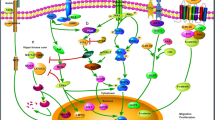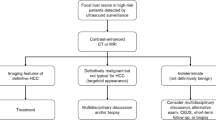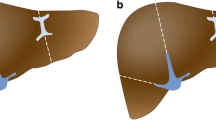Abstract
Objective
The purpose of this study was to delineate infiltrating hepatocellular carcinoma (HCC) and to compare patient characteristics, tumor characteristics, and outcomes with patients presenting with HCC tumors of discrete, nodular morphology at a similar stage.
Methods
Patient demographic and tumor characteristics of 224 patients diagnosed with infiltrative or advanced discrete, nodular HCC at the University of Texas Southwestern Medical Center were collected between January 2005 and December 2011. Patient demographics, tumor characteristics, treatment regimens, and overall survival were analyzed between the two groups.
Results
Overall, 135 patients were diagnosed with infiltrative HCC compared with 89 patients with either T3a or T3b nodular, discrete HCC. Infiltrative HCC patients were more likely to have symptoms at presentation compared with the nodular HCC cohort, (95 vs. 78 %; p < 0.001). No difference in underlying liver function or etiology of liver disease between cohorts was observed. Patients with infiltrative HCC were more likely to have metastatic disease (53 vs. 35 %; p = 0.007) and malignant venous thrombus (75 vs. 62 %; p < 0.001) compared with the nodular group. Infiltrative HCC had a median survival of 1.9 months compared with 4.3 months in the nodular HCC group (p < 0.0001). Within the infiltrative HCC cohort, symptoms [hazard ratio (HR) 7.2, 95 % confidence interval (CI) 1.9–27], Child–Pugh class C (HR 3.9, 95 % CI 2.1–7.1), hepatic thrombus (HR 5.6, 95 % CI 1.9–16), and lack of treatment (HR 5.6, 95 % CI 2.1–14.6) were associated with worse survival.
Conclusions
Infiltrative HCC had a worse outcome than nodular, discrete HCC most likely secondary to burden of tumor manifested by extrahepatic metastases, vascular invasion, higher α-fetoprotein levels, and a high degree of symptoms.

Similar content being viewed by others
References
Ferlay J, Soerjomataram I, Dikshit R, Eser, S, Mathers, C, Rebelo, M, et al. Cancer incidence and mortality worldwide: sources, methods and major patterns in GLOBOCAN 2012. Int J Cancer. 2015;136:E359–86.
El-Serag HB, Mason AC. Rising incidence of hepatocellular carcinoma in the United States. N Engl J Med. 1999;340:745–50.
Trevisani F, Caraceni P, Bernardi M, D’Intino, PE, Arienti, V, Amorati, P, et al. Gross pathologic types of hepatocellular carcinoma in Italian patients. Relationship with demographic, environmental, and clinical factors. Cancer. 1993;72:1557–63.
Okuda K, Noguchi T, Kubo Y, Kubo, Y, Shimokawa, Y, Kojiro, M, et al. A clinical and pathological study of diffuse type hepatocellular carcinoma. Liver. 1981;1:280–9.
Benvegnu L, Noventa F, Bernardinello E, Pontisso, P, Gatta, A, Alberti, A. Evidence for an association between the aetiology of cirrhosis and pattern of hepatocellular carcinoma development. Gut. 2001;48:110–5.
Lopez RR Jr, Pan SH, Hoffman AL, Ramirez, C, Rojter, SE, Ramos, H, et al. Comparison of transarterial chemoembolization in patients with unresectable, diffuse vs focal hepatocellular carcinoma. Arch Surg. 2002;137:653–7; discussion 657-8.
Mehta N, Fidelman N, Sarkar M, Yao, FY. Factors associated with outcomes and response to therapy in patients with infiltrative hepatocellular carcinoma. Clin Gastroenterol Hepatol. 2013;11:572–8.
Kneuertz PJ, Demirjian A, Firoozmand A, Corona-Villalobos, C, Bhagat, N, Herman, J, et al. Diffuse infiltrative hepatocellular carcinoma: assessment of presentation, treatment, and outcomes. Ann Surg Oncol. 2012;19:2897–907.
Bruix J, Sherman M; American Association for the Study of Liver Diseases. Management of hepatocellular carcinoma: an update. Hepatology. 2011;53:1020–2.
Demirjian A, Peng P, Geschwind JF, Cosgrove, D, Schutz, J, Kamel, I, et al. Infiltrating hepatocellular carcinoma: seeing the tree through the forest. J Gastrointest Surg. 2011;15:2089–97.
Llovet JM, Bru C, Bruix J. Prognosis of hepatocellular carcinoma: the BCLC staging classification. Semin Liver Dis. 1999;19:329–38.
Green F. Liver (excluding intrahepatic bile ducts). In: Edge S, Byrd DR, Compton CC (eds). AJCC cancer staging handbook. 7th ed. New York: Springer; 2010.
Marrero JA, Fontana RJ, Barrat A, Askari, F, Conjeevaram, HS, Su, G, et al. Prognosis of hepatocellular carcinoma: comparison of 7 staging systems in an American cohort. Hepatology. 2005;41:707–16.
Lu W, Dong J, Huang Z. Comparison of four current staging systems for Chinese patients with hepatocellular carcinoma undergoing curative resection: Okuda, CLIP, TNM and CUPI. J Gastroenterol Hepatol. 2008;23:1874–8.
Cillo U, Vitale A, Grigoletto F, Farinati, F, Brolese, A, Zanus, G, et al. Prospective validation of the Barcelona Clinic Liver Cancer staging system. J Hepatol. 2006;44:723–31.
Marrero JA, Kudo M, Bronowicki JP. The challenge of prognosis and staging for hepatocellular carcinoma. Oncologist. 2010;15 Suppl 4:23–33.
Schwartz ME, Shrager B. Surgical resection for hepatocellular carcinoma in the noncirrhotic: the Western experience. Recent Results Cancer Res. 2013;190:85–100.
Disclosures
Adam C. Yopp, Ali Mokdad, Hao Zhu, John C. Mansour, Glen C. Balch, Michael A. Choti, and Amit G. Singal have no disclosures to declare.
Author Contributions
ADAM Yopp, Amit Singal, and Ali Mokdad contributed to the study concept and design, acquisition of data, analysis and interpretation of data, drafting of the manuscript, and statistical analysis. Adam Yopp, Amit Singal, Ali Mokdad, Glen Balch, Michael Choti, John Mansour, and Hao Zhu undertook critical revision of manuscript.
Author information
Authors and Affiliations
Corresponding author
Rights and permissions
About this article
Cite this article
Yopp, A.C., Mokdad, A., Zhu, H. et al. Infiltrative Hepatocellular Carcinoma: Natural History and Comparison with Multifocal, Nodular Hepatocellular Carcinoma. Ann Surg Oncol 22 (Suppl 3), 1075–1082 (2015). https://doi.org/10.1245/s10434-015-4786-7
Received:
Published:
Issue Date:
DOI: https://doi.org/10.1245/s10434-015-4786-7




